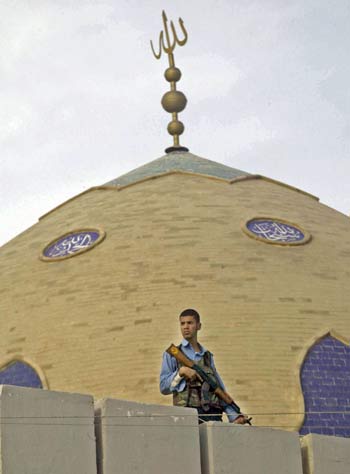
An Iraqi policeman guards Sunni Muslim Scholars Association headquarter in the southern city of Basra (AFP)
BAGHDAD, Iraq, AP – Sunni Arab politicians are ready to end their boycott of talks on forming a new government if rival Shiites return mosques seized in last week’s wave of sectarian attacks and meet other unspecified demands, a top Sunni figure said Monday.
Meanwhile, there was no word on the fate of Jill Carroll, an American journalist seized last month. The Sunday deadline set by her kidnappers in a message this month to a Kuwaiti television station passed without any new message from her abductors.
The Sunnis walked out of the talks Thursday after the bombing of a Shiite shrine in Samarra triggered a wave of reprisal attacks against Sunni mosques in Baghdad, Basra and elsewhere. The walkout threatened U.S. plans to establish a unity government capable of luring Sunnis away from the insurgency so U.S. and other international troops can begin heading home.
Adnan al-Dulaimi, whose Iraqi Accordance Front spearheaded the Sunni boycott, said the Sunnis have not decided to return to the talks but are “intent on participating” in a new government.
“The situation is tense and within the next two days, we expect the situation to improve and then we will have talks,” he told The Associated Press. “We haven’t ended our suspension completely but we are on the way to end it.”
He cited “some conditions” that must be met first, chief among them the return of mosques still occupied by Shiite militants in Baghdad and Salman Pak. Al-Dulaimi did not mention the other demands, but some Sunni politicians have insisted on replacing Shiite police with Sunni soldiers in heavily Sunni areas.
Baghdad was generally peaceful Monday — the first day without extended curfews or a ban on private vehicles since the crisis erupted, pushing the nation to the brink of civil war.
Four bodies — blindfolded and handcuffed — were found Monday in Dora, a Baghdad neighborhood where a mortar barrage the night before killed 16 people and wounded 53. Two Iraqi soldiers were wounded in an ambush Monday in Mahmoudiya, about 20 miles south of the capital, officials said.
The U.S. military said an American soldier had died from non-combat related injuries suffered Friday north of Baghdad. The statement did not elaborate. Three soldiers were killed Sunday in combat operations in the capital.
Their deaths brought to at least 2,291 the number of members of the U.S. military who have died since the beginning of the Iraq war in March 2003, according to an Associated Press count. The figure includes seven military civilians.
Elsewhere, 14 suspected insurgents were arrested late Sunday in Diyala province, a religiously mixed area which was also placed under expanded curfew last week. An Iraqi army statement said troops found rockets, hand grenades and bomb making materials in the raids.
Gunmen killed two youths playing soccer in the Diyala provincial capital and wounded five in an attack Sunday. Thirteen members of a Shiite family were massacred in Diyala last week.
Carroll, a freelancer working for the Christian Science Monitor, was abducted Jan. 7 in Baghdad and was last seen on a videotape broadcast Feb. 10 by a Kuwaiti television station, Al-Rai. The station said the kidnappers threatened to kill her unless the United States met unspecified demands by Sunday.
An Interior Ministry official said that authorities had stepped up their search for the 28-year-old woman but made no progress.
“Our forces raided some suspected places, but she was not there,” Maj. Falah al-Mohammedawi said. “We are watching the situation closely.”
Although sectarian violence has receded since the attacks last week, tensions remain high between majority Shiites and the minority Sunnis. Shiites dominate ranks of the government security forces and most of the insurgents are Sunnis.
More than 60 Shiite families fled their homes in predominantly Sunni areas west and north of Baghdad after receiving threats, said Shiite legislator Jalaladin al-Saghir and Iraqi army Brig. Gen. Jalil Khallaf.
Sunni-Shiite clashes have raised doubts about U.S. plans to begin withdrawing some of the 138,000 U.S. soldiers this year.
A former British ambassador to Iraq predicted Sunday that increasing sectarian bloodshed would require the U.S.-led foreign military coalition to stay for some time to help keep peace among rival ethnic and religious groups.
“One could almost call it a low-level civil war already,” Sir Jeremy Greenstock, who was Britain’s envoy in Baghdad until 2004, told British television channel ITV1.
Sunni and Shiite religious leaders have also called for unity and an end to attacks on each other’s mosques.
Radical Shiite cleric Muqtada al-Sadr, whose own militia was blamed for many of the attacks on Sunnis, repeated the appeal Sunday when he addressed followers in the southern Shiite stronghold of Basra upon his return from neighboring Iran.
He accused Americans and their coalition partners of stirring up sectarian unrest and demanded their withdrawal.

An Iraqi woman walks near a soldier standing guard in Baghdad (R)

An Iraqi father takes her daughter for a stroll as the curfew was relaxed for few hours, in Baqouba (AP)
